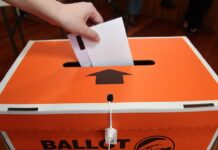Pacific Summit – Niue and the Cook Islands are included in the United States diplomatic offensive
Last week, the White House hosted the leaders of many Pacific nations for the second Pacific Islands Summit. An annual event, started by President Joe Biden to demonstrate the United States’s interest in; and commitment to the region. The meeting in Washington was a three-day diplomatic event during which the United States sought to impress on the attendees that they are highly valued partners.
The demonstration continued with commitments to deliver undersea digital cables in the region, millions of dollars of infra-structure investment and stating his commitment to the United States – Pacific Partnership. On top of these commitments the United States President also used the event to establish formal diplomatic relationships with two of the smallest nations on Earth; Niue and the Cook Islands.
This is an interesting development, one that demonstrates the increasing importance of small nations as major powers compete to control bases on the few pieces of available real estate available in the vastness of the Pacific. Building the networks of bases during peace-time that will let them control large areas of the Pacific Ocean in a future conflict.
However, this week President Biden’s plans in the Pacific were compromised by domestic politics as the Republican dominated Congress blocked government spending. This domestic political situation is dangerous for American foreign policy because if commitments to the Pacific are not met it will seriously undermine United States credibility in the Pacific and ‘open the door’ for more aggressive Chinese diplomacy.
Economic impact of the AUKUS submarines
The United Kingdom government announced this week that it has awarded the contracts for constructing the new AUKUS Class nuclear powered submarines. The Royal Navy will start to receive the new vessels from about 2030 and the Royal Australian Navy from about 2040.
The consortium of contractors working on the submarines includes Australian company Babcock. This is a good example of how defence procurements are used to strengthen a purchasing nation’s economy. By ensuring an Australian company is involved in the project the nation aims to recoup some of the cost of the purchase. The term ‘military industrial complex’ is often used to describe the relationships between a nation’s military, that uses vast amounts of manufactured goods and their civilian suppliers. In recent decades, Australia has worked hard to build it defence industry to support its armed forces.
Australian companies manufacture equipment like armoured vehicles, rifles, artillery, aircraft, naval vessels and drones. Additionally, Australian companies manufacture a range of expendables like ration packs and ammunition. The Australian’s learned a tough lesson in World War Two when Japan’s dominance of their northern approaches from Singapore to the Coral Sea seriously threatened trade. So, since the war they have focus on developing a strong domestic military industrial complex and the AUKUS deal will add enormously to their industrial capability and future security.
Australia to spend $1.5 billion improving its airborne surveillance capability
In September, the Australian government announced its intent to spend about $ 1.5 billion to improve its airborne surveillance capabilities, including an extensive upgrade of its fleet of 14, P8A Poseidon, anti-submarine warfare aircraft and the purchase of another expensive Triton drone.
Australia’s fleet of Triton drones will grow from three to four of these large and impressive drones. Triton drones are large aircraft with a wingspan of approximately 40 metres, they are sophisticated long-range surveillance platforms able to stay in the air for 30 hours. Triton’s published surveillance data states that its radar can search roughly 5000 square km of ocean in one sweep. Or in a New Zealand context, searching a couple of hundred kilometres into the Pacific Ocean between Auckland and Cape Reinga every time the radar rotates. A Triton drone is a very mobile airborne radar station able to monitor vast stretches of ocean. Additionally, Triton can be used as an aerial data link for a theatre of operations; ships aircraft and ground forces using the drone to relay digital information between them.
This purchase is not unexpected, Australia’s new defence strategy is focussed on dominating its northern approaches and surveillance is a key element of this planning. Upgrading the Poseidon fleet and buying another Triton drone are all part of this plan, making sure that Australia can monitor underwater and overwater activity far from its coastline. During peacetime these assets will protect Australian fisheries and maritime trade, locate lost vessels and support law enforcement. In a future conflict their intelligence gathering capabilities will provide Australia with better information and more distance to manage threats.
Meeting of Pacific Defence Ministers planned in New Caledonia
In December, New Caledonia will host a meeting of regional Defence Ministers. Meetings like this happen often and are a regular feature of international diplomacy. However, the conference’s location is evidence of France’s interest in the region and its desire to take a leadership role in Pacific affairs. France’s colonial ambitions in the Pacific add another dimension to regional competition. Instead of a binary competition between the United States and its allies against China, France’s position is harder to define.
Since World War Two, France has sought to retain its position as a ‘Great Power’ rather than falling into step with the United States and NATO during the Cold War. Instead, it fought hard to retain its colonial empire; and New Caledonia and French Polynesia are surviving French colonies. France retains an independent nuclear deterrent, inflicting years of nuclear testing on the people of its Pacific colonies and expense on its own people. At various times it has pulled out of NATO and has always set a defiantly independent course in diplomatic relations.
France is a ‘wild card’ and appears keen to try and become a third option in the Pacific’s generally Sino-American geo-politics. A situation that could create more tension in the region.
Melanesian update
Melanesia is probably the Pacific’s most unstable area. Unfortunately, Melanesia is becoming strategically important in Sino-American military competition because it provides useful forward bases. The area also has vast untapped natural resources. Factors that combined with the small size of Melanesia’s nations, their weak government institutions and histories of political instability make the region highly volatile and vulnerable to external influence. Therefore, it is useful to provide a regular update on Melanesia.
Papua New Guinean police officers in trouble
Trouble was reported in the Papua New Guinean Police Force last week. A group of 19 officers facing drugs and murder charges. Another example of the problems that this small nation faces building its state institutions. While being expected to deal with an inter-tribal war in Enga Province and student riots in East New Britain, the police force is also struggling to contain corruption within its own ranks.
This week in Washington, Papua New Guinea Prime Minister, James Marape told United States President Joe Biden that the nation needs investment not aid. However, the struggle to maintain law and order of build strong state institutions like an effective police force able to retain the rule of law indicates that aid may be more useful. And; without strong government institutions private investment is risky and therefore unlikely.
Political instability continues in Vanuatu
Recently, Vanuatu has been subjected to ongoing political instability. A flurry of ‘no-confidence’ motions against two different Prime Ministers and the Speaker of Parliament working through both the house and the courts in recent weeks. On 2 October, MPs boycotted parliament.
This political instability is concerning because its does not seem to be slowing down or stabilising. Although, the changes in government are currently peaceful the nation has a history of violent protest. Additionally, China sent ‘police’ support to the nation adding another factor to the political situation that the United States and Australia will be concerned about. However unlikely it is; a collapse of government in Vanuatu would be de-stabilising for Melanesia.
Ben Morgan is a bored Gen Xer and TDBs military blogger





Ben – No Pacific NATO…
We need to escape this madness.
Vote for New Zealand Neutrality. Vote TPM
https://www.scoop.co.nz/stories/PO2302/S00034/te-pati-maori-announce-military-neutrality-as-new-transformative-defence-policy.htm
“In 1987 Aotearoa declared that we were nuclear free. Te Pāti Māori now declares that Aotearoa must be militarily neutral, a Switzerland of the South Pacific” said Rawiri Waititi.
“We must asset our Rangatiratanga and Mana Māori Motuhake. In doing that, we must assert our own Foreign Policy and Military requirements. We will no longer have our sovereignty determined by others, whether it is in Canberra, London, Washington, Beijing or Moscow.
Wonder who the Chinese Criminal Party is attacking this week.
Oh, look, its the Philippines.
https://www.reuters.com/world/asia-pacific/near-collision-tense-encounter-beijing-flexes-muscles-south-china-sea-2023-10-06/
Just another day in the South China Sea, being threatened by the CCP